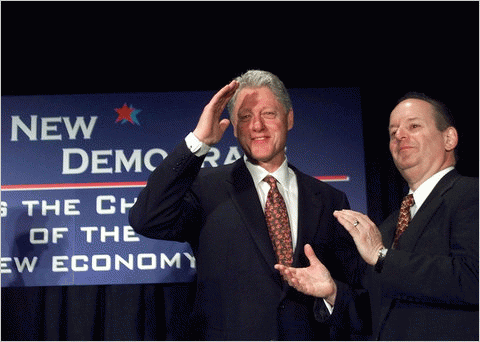
President Bill Clinton with Al From, president of the Democratic Leadership Council
(Image by Someone Else) Details DMCA
The concept of globalization was sold to the American people by the Democratic Party and its so-called progressive economists after Bill Clinton took office as POTUS in 1993. The push was palpable and involved most of the liberal economists still active today. It was necessary because Clinton had promised to veto NAFTA if elected, and that promise was deemed necessary to acquire the votes of former H. Ross Perot (watch) supporters when he dropped out of the race. NAFTA was understood (correctly) by those voters to be the threat to the middle class that it actually became when Clinton betrayed his promise and signed it into law on December 8, 1993.
Books such as The Work of Nations, by Robert Reich and Pop Internationalism, by Paul Krugman were published in an attempt to explain why NAFTA wasn't such a bad deal and globalization was inevitable. These books predicted that though we would have growing pains as our economy adjusted to the decrease in manufacturing and the increase in global trade-related work, everything would be just fine in the long run. As we all know, the long run has not ended, and things are not moving in a positive direction for 99% of us.
Reich's book warns against thinking in terms of a choice between zero-sum nationalism and "impassive cosmopolitanism", and suggests a third option, "a positive nationalism, in which each nation's citizens take primary responsibility for enhancing the capacities of their countrymen for full and productive lives, but who also work with other nations to ensure that these improvements do not come at others' expense." (p 311). If this sounds like smoke and mirrors to you, you are not alone.
Krugman instructs us (pp 89-95) in the concept of "comparative advantage" as discussed by economist David Ricardo in 1817 in a theoretical paper.
According to Ricardo's theory, even countries with no absolute advantage in any market product can benefit from free trade through comparative advantage. The theory falls apart when you look closely at the variables that are being ignored and what is being put at risk when nations forego efforts to be as self-sufficient as possible in favor of narrow specialization in production of whatever product provides them a comparative advantage in trade. It falls flat on its face when you compare Ricardo's prescription with what this nation is actually doing today.
Ricardo's theory rests on the assumption that the goal of policy is to increase total global consumption for a given constant amount and cost of labor in a global economy where trade between countries is freely permitted. This is, in theory, accomplished by controlling what will be produced, exported, and imported based on the opportunity cost of production of each nation's products and trade agreements between nations. It assumes that:
1. manufacturers are willing or can be coerced into producing what the trade cost/benefit analysis shows is optimum.
2. there is no loss of self-sufficiency, indeed, that self-sufficiency is not an issue.
3. all trading partners will always be willing trading partners that will dutifully produce, export, and import according to the optimum formula.
4. labor factors that once produced automobiles would be equally compensated and happy if required to pick melons in the fields instead for the same pay, and that car manufacturers would be happy to shut down their factories. No laborers would lose income, in theory.
5. costs of transportation of goods are assumed equal before and after reallocating production
But reality intrudes on this idyllic dream. The governments of free nations don't dictate what their industries will consist of and produce. And any nation that is not basically self-sufficient is disadvantaged in any realistic trade arrangement. Further, what nations and their industries are magnanimous enough to sacrifice, even temporarily, their own prosperity in the hope of increasing total global consumption without risk of losing jobs and increasing the cost of goods? None! And that is why globalization is actually globaloney.
(See http://internationalecon.com/Trade/Tch40/T40-0.php for a tutorial on Ricardian theory.)





